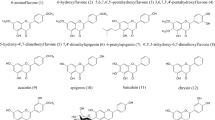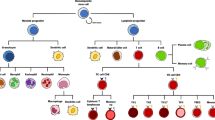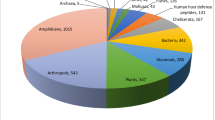Abstract
Toll-like receptors (TLRs) are a group of pattern-recognition receptors that play an important role in the induction of innate immune responses, recognizing conserved microbial structural molecules. The microbial pathogens trigger the activation of myeloid differential factor 88 (MyD88)- and toll-interleukin-1 receptor domain-containing adapter inducing interferon-β (TRIF)-dependent pathways, leading to proinflammatory cytokine production. Here, we investigated the effect of the ethanol extracts of Carpesium abrotanoides (CAB), a traditional Korean medicine, on the expression of cyclooxygenase-2 (COX-2) by TLR agonists in murine macrophages. CAB suppressed COX-2 expression induced by lipopolysaccharide (TLR4 agonist), polyriboinosinic polyribocytidylic acid (TLR3 agonist), and macrophage-activating lipopeptide 2-kDa (TLR2 and TLR6 agonist). These results suggest that CAB can regulate the TLR signaling pathways to treat chronic inflammatory diseases.
Similar content being viewed by others
References
Iwasaki, A. & Medzhitov, R. Regulation of adaptive immunity by the innate immune system. Science 327, 291–295 (2010)
Kawai, T. & Akira, S. The role of pattern-recognition receptors in innate immunity: update on Toll-like receptors. Nat. Immunol. 11, 373–384 (2010).
O’Neill, L. A. & Bowie, A. G. The family of five: TIRdomain-containing adaptors in Toll-like receptor signalling. Nat. Rev. Immunol. 7, 353–364 (2007).
Lee, S. B. et al. The chemopreventive effects of Carpesium abrotanoides are mediated by induction of phase II detoxification enzymes and apoptosis in human colorectal cancer cells. J. Med. Food 13, 39–46 (2010).
Lee, J. et al. Cytotoxic sesquiterpene lactones from Carpesium abrotanoides. Planta Med. 68, 745–747 (2002).
Lee, J. H., Hwang, K. H. & Kim, G. H. In vitro evaluation of anti-inflammatory activity for salad-food material Carpesium abrotanoides. J. Food Biochem. 37, 18–25 (2013).
Li, Q. & Verma, I. M. NF-kappaB regulation in the immune system. Nat. Rev. Immunol. 2, 725–734 (2002).
Hacker, H. & Karin, M. Regulation and function of IKK and IKK-related kinases. Sci. STKE 2006, re13 (2006).
Vane, J. R., Bakhle, Y. S., & Botting, R. M. Cyclooxygenases 1 and 2. Annu. Rev. Pharmacol. Toxicol. 38, 97–120 (1998).
Vane, J. R. Inhibition of prostaglandin synthesis as a mechanism of action for aspirin-like drugs. Nat. New Biol. 231, 232–235 (1971).
Simmons, D. L., Levy, D. B., Yannoni, Y. & Erikson, R. L. Identification of a phorbol ester-repressible v-srcinducible gene. Proc. Natl. Acad. Sci. USA 86, 1178–1182 (1989).
Murakami, A. & Ohigashi, H. Targeting NOX, INOS and COX-2 in inflammatory cells: chemoprevention using food phytochemicals. Int. J. Cancer 121, 2357–2363 (2007).
Kawai, T. & Akira, S. Toll-like receptor and RIG-Ilike receptor signaling. Ann. NY Acad. Sci. 1143, 1–20 (2008).
Kawai, T. & Akira, S. Signaling to NF-kappaB by Tolllike receptors. Trends Mol. Med. 13, 460–469 (2007).
Fitzgerald, K. A. et al. IKKepsilon and TBK1 are essential components of the IRF3 signaling pathway. Nat. Immunol. 4, 491–496 (2003).
Meylan, E. et al. RIP1 is an essential mediator of Tolllike receptor 3-induced NF-kappaB activation. Nat. Immunol. 5, 503–507 (2004).
Kawai, T. et al. Lipopolysaccharide stimulates the MyD88-independent pathway and results in activation of IFN-regulatory factor 3 and the expression of a subset of lipopolysaccharide-inducible genes. J. Immunol. 167, 5887–5894 (2001).
Gao, J. J. et al. Autocrine/paracrine IFN-alphabeta mediates the lipopolysaccharide-induced activation of transcription factor Stat1alpha in mouse macrophages: pivotal role of Stat1alpha in induction of the inducible nitric oxide synthase gene. J. Immunol. 161, 4803–4810 (1998).
Bjorkbacka, H. et al. The induction of macrophage gene expression by LPS predominantly utilizes Myd88-independent signaling cascades. Physiol. Genomics 19, 319–330 (2004).
Takeda, K. & Akira, S. Toll-like receptors in innate immunity. Int. Immunol. 17, 1–14 (2005).
Youn, H. S. et al. Specific inhibition of MyD88-independent signaling pathways of TLR3 and TLR4 by resveratrol: molecular targets are TBK1 and RIP1 in TRIF complex. J. Immunol. 175, 3339–3346 (2005).
Park, S. J. et al. Costunolide Inhibits Cyclooxygenase-2 Expression Induced by Toll-like Receptor 3 or 4 Agonist. Toxicol. Environ. Health Sci. 1, 122–126 (2010).
Park, S. J. & Youn, H. S. Isoliquiritigenin suppresses the Toll-interleukin-1 receptor domain-containing adapter inducing interferon-beta (TRIF)-dependent signaling pathway of Toll-like receptors by targeting TBK1. J. Agric. Food Chem. 58, 4701–4705 (2010).
Author information
Authors and Affiliations
Corresponding author
Additional information
These authors contributed equally to this work.
Rights and permissions
About this article
Cite this article
Jeong, DW., Lee, EK., Lee, CH. et al. Carpesium abrotanoides extract inhibits cyclooxygenase-2 expression induced by toll-like receptor agonists. Toxicol. Environ. Health Sci. 5, 92–96 (2013). https://doi.org/10.1007/s13530-013-0161-x
Received:
Revised:
Accepted:
Published:
Issue Date:
DOI: https://doi.org/10.1007/s13530-013-0161-x




